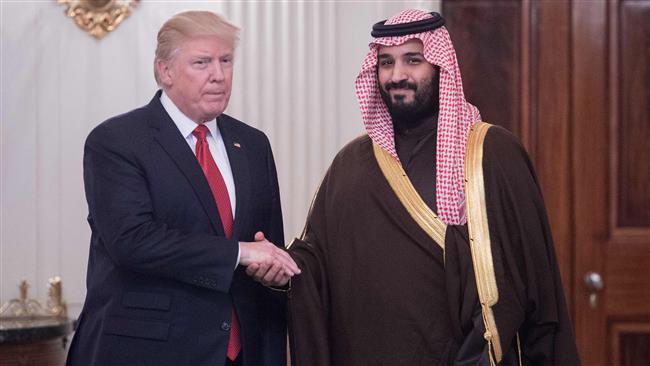US, Saudis seek ‘enduring strategic partnership’: White House
US President Donald Trump and Saudi Deputy Crown Prince Mohammed bin Salman have reconfirmed their support for a “strong, broad, and enduring strategic partnership” based on shared mutual interests, according to the White House.
During their first meeting on Tuesday at the White House, the two leaders moved to forge warmer ties after a period of tension between Washington and longstanding ally Riyadh during the administration of former president Barack Obama, particularly over the nuclear deal with Iran.
Trump and Salman “directed their teams to explore additional steps across a broad range of political, military, security, economic, cultural, and social dimensions to further strengthen and elevate the United States-Saudi strategic relationship for the benefit of both countries,” the White House said in a statement on Wednesday.
“The two countries announced their determination to strengthen their cooperation in the economic, commercial, investment, and energy fields, with the aim of realizing growth and prosperity in the two countries and the global economy,” the statement said.
The statement also claimed that Trump and Salman will seek closer cooperation in fighting Daesh (ISIL) and “other transnational terrorist organizations that pose a threat to all nations.”
Read More:
- 'Saudis, Israel waging psychological war against Iran'
- 'Al Saud-Israel stance against Iran no coincidence'
- Trump accuses Iran of seeking nuclear weapons
The new American president and the crown prince, who is also the kingdom's defense minister and the son of King Salman, said they would confront what they called Iran's “destabilizing regional activities” while continuing to evaluate and strictly enforce the Iran nuclear agreement, known as the Joint Comprehensive Plan of Action (JCPOA).
Salman’s visit comes just one month after a meeting between Trump and Israeli Prime Minister Benjamin Netanyahu at the White House.
During that meeting, Netanyahu called Iran's atomic program a threat to Israel, although Israel is widely believed to possess the only nuclear arsenal in the Middle East.

Analysts say it is not a matter of chance that Israel and Saudi Arabia share an anti-Iran stance amid ample evidence that the two regimes are cooperating in different regional conflicts.
Both the regimes in Tel Aviv and Riyadh are widely viewed as staunch supporters of the militant groups operating in Syria to topple its government.
Daesh, the world’s most notorious terror group mainly active in Syria and Iraq, is inspired by Wahhabism, which is a radical Takfiri ideology dominating Saudi Arabia and freely preached by Riyadh-backed clerics there.
“The relationship between the Saudi monarchy and the American imperialism has always been very close and intense,” Ralph Schoenman, an analyst in California and the author of Hidden History of Zionism, said in an interview with Press TV on Wednesday.
Washington’s close ties with Arab monarchies in the Persian Gulf region is “a measure of corruption of US imperialism,” Schoenman said.
VIDEO | Iran-Syria: For Resistance
Qassam Brigades claims killing 3 Israeli troops in northern Gaza
More alive than ever: Sayyed Hassan Nasrallah's legacy grows stronger in martyrdom
Occupation of Syria’s highest peak Mount Hermon part of ‘Greater Israel’ project
Iran: Syrian people will decide their future without foreign interference
IRGC says Iran’s power exceeds borders, warns enemies to adjust themselves
Dozens detained, several wounded in Israeli raids in West Bank
‘Ethnic cleansing’: Hamas blasts Israeli attacks on Gaza hospital amid intl. silence










 This makes it easy to access the Press TV website
This makes it easy to access the Press TV website